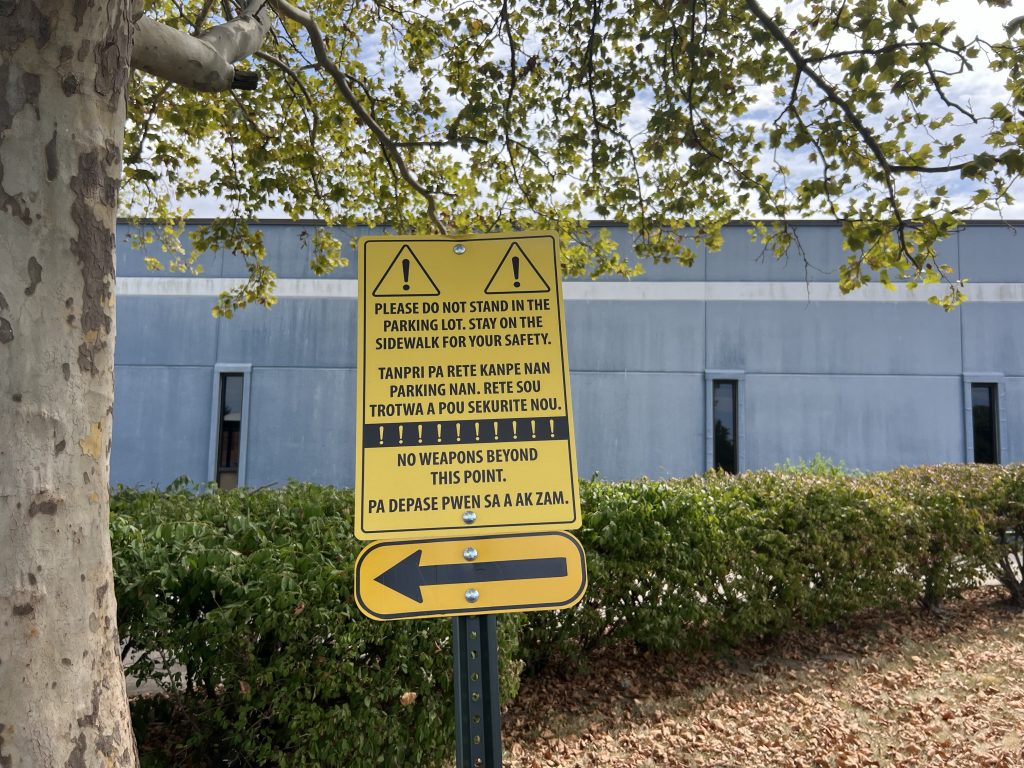This article was originally published on Wash Free Beacon - Politics. You can read the original article HERE
SPRINGFIELD, Ohio—"If we only had 5,000, I wouldn’t be talking to you right now," says Reverend Barron—real name Kenneth Selig—in what’s become a common refrain in the embattled city of Springfield, Ohio.
Barron, a street preacher, food truck owner, and former warehouse manager, has emerged as a colorful champion for the small city as it struggles through an unprecedented transformation. As many as 20,000 Haitian immigrants, city officials say, have arrived in Springfield since the pandemic, swelling its population to almost 80,000. Times were already tough before the rumors started swirling about migrants eating cats, dogs, and geese.
"Look man, why would they be eating animals? They have vouchers, they’re displacing people here, that’s the problem," Barron said. "We can have town meetings with our pitchforks, yelling, but I’m over that. Reasonable men need to sit down and think of a solution."
Barron, a burly figure with denim overalls, a red hat, and a great white beard, went viral on social media earlier this month when he gave a fiery speech at a town meeting about the city’s growing homeless population. The video has 9.5 million views on X.
"I don’t know of a single homeless Haitian in this town because they all got vouchers," he bellowed at the city elders. "I’d like to show you the whole bunch of people who’ve been displaced."

Springfield has been inundated with reporters from around the world in recent days—Barron says someone from the World Economic Forum, an organization with which he was not familiar, even rang him up—after J.D. Vance tweeted out the pet-eating rumors. The following evening, Donald Trump declared at a debate that "they’re eating the pets."
To be sure, many Springfield residents swear that the city’s park used to have geese and a lot more ducks. And, to be sure, there was not a single goose to be found on Tuesday afternoon and a relatively paltry number of other waterfowl. (Nor were there any visible incidents of cats or dogs on a Weber.)
But none of that, despite the media maelstrom, matters much to those in Springfield who spoke with the Washington Free Beacon. They describe a city in crisis as it struggles to absorb the thousands of Haitians granted Temporary Protected Status by the Biden-Harris administration.
If avian welfare was Springfield’s primary trouble, says Mark Sanders, a school bus driver, the city wouldn’t need much help. But the tabloid-like attention on alleged animal cruelty only serves to distract from a litany of crises that locals say their leaders are ignoring.
"We’re a multicultural city, but it’s just too many and our leaders are trying to minimize the impact," said Sanders. "It’s like fertilizer mixed with diesel fuel."
Rents are rising faster than national trends, which local landlords attribute to Haitian renters who, aided by left-wing charities, have successfully applied for Section 8 housing vouchers. The wait list for these vouchers is now closed.
Crime was already higher in Springfield than most similarly sized cities, but residents are now dealing with a scourge of traffic violations. Ohio governor Mike DeWine (R.) wrote Friday in the New York Times (not widely read in Springfield) that "ensuring that Haitians learn how to drive safely and understand our driving customs and traffic laws remains a top priority."
Social services are overwhelmed, and some Springfield residents are blaming their layoffs on the flood of cheap Haitian labor, an allegation supported by Springfield’s curiously lethargic wage growth since 2022. And some of the city’s most vulnerable populations say they’ve been pushed aside.
"They’re taking attention away from people like me," said a homeless woman who called herself Mama D. "I don’t dislike the Haitians, but it’s harder for us to get houses now. The cheapest apartments go for $700 a month now."
A common defense from sympathetic parties is that the Haitians are here to work. That is largely true, although no one believes there are 20,000 vacant positions in the county.
The thousands of Haitians who poured into Springfield in recent years—legal migrants due to permissive Biden-Harris policies that have welcomed refugees from failed states such as Haiti and Venezuela—were drawn by word of mouth about jobs. They were met by immigrant-focused charities who helped them apply for social services and find low-wage jobs.
One consequence is a sharp uptick in welfare dependency in the Springfield metro area. Roughly 8,000 people of Haitian origin are now receiving federal assistance from programs like Medicaid. In March 2022, that figure was fewer than 1,000.
On Tuesday afternoon, this reporter saw a stream of Haitians, many with children, entering and leaving the city’s welfare office at a constant pace. Makeshift signs outside the building feature instructions in Haitian Creole.

"I am legal," one Haitian man said as he left with a folder of papers in his hands.
Much attention has been paid in the last year to megacities like New York and Chicago flailing in the face of a migrant surge. But it’s much smaller places like Springfield that may have it the worst. Mayor Rob Rue, a Republican, said in July the city is "overwhelmed" and equipped to provide services like public safety and firefighting for 60,000 people, not upwards of 80,000.
"There’s no middle ground here, everyone is polarized," said Zach, who runs a local towing firm and declined to give his full name. "But business is harder because when I tow a car that has been in an accident, the owner never comes and gets it because they don’t have a license or insurance."
Springfield City Schools has seen an explosion in non-English speaking students, increasing 540 percent in the last seven years. The local school system, Rue said, is averaging "40 new students every week, many of whom don’t speak English."
DeWine’s critics say he’s been slow to respond. It was only last week that he announced a $2.5 million aid package for "expanding primary care access for everyone living in Springfield." That money—though not the first time the state has sent funds to Springfield—came only after Trump’s comments that "they’re eating the dogs."
DeWine said in a statement that Ohio is on its own: "The federal government does not have a plan to give any support to the communities impacted by surges, and we have absolutely no indication that a plan is coming in the near future."
That slow response has created a campaign issue for Republican Bernie Moreno, who is running to unseat incumbent senator Sherrod Brown (D.) in a high-stakes race that’s considered a toss-up. In a visit to Springfield earlier this month, Moreno said "what’s going on in the community is a disgrace."
The question on everyone’s mind is simple: Why Springfield?
The Biden administration has offered temporary legal status to roughly 300,000 Haitians through a heavily criticized executive order. Conspiracy theories abound about how so many of these migrants ended up in one small, downtrodden city. But the true explanation is more banal—and a symptom of a broken immigration system.
There are vacant positions at small and medium-sized manufacturers in Springfield, which local business leaders are more than happy to fill with foreigners willing to accept rock-bottom wages. And in places like Springfield that have fared poorly in the face of deindustrialization, local governments often give those business leaders what they want.
"They’re not really bothering nobody, but I was down at the food pantry and had to wait two-and-a-half hours," said Kelly Hall, who works at a local church. "It felt like there were 3,000 Haitians in line. You used to be able to fill your cart up, now you’re lucky if you get one thing."
A cottage industry of employment agencies now view Springfield as a hot market. One resident described an "unholy alliance" between local businesses and state-subsidized, left-wing nonprofits.
Springfield residents pointed to First Diversity Staffing, a temp agency run by a Haitian-American named George Ten.
Ten, who lives in a seven-figure home about 30 minutes from Springfield and drives a Porsche, did not respond to requests for comment. He oversees a temp agency with offices in Ohio and offers work to migrants—many of them Haitian—in Kentucky, North Carolina, New York, and Indiana. He counts major businesses including Dole Fresh Vegetable Co. among his clients.
First Diversity’s vans shuttle Haitians—a seemingly endless supply of cheap labor—to and from local employers who are more concerned with filling open positions than lowering local housing costs. Ten is reported to own dozens of houses in the Springfield area where his workers can find cheap lodging. He also maintains relationships with local landlords.
"These landlords charge $250 a month for bed in a house, and when I say bed, I mean the minute one of them gets up, another comes home from his shift and gets in," said Sanders, the school bus driver. "It’s a cyclical indentured servitude that is basically being encouraged and championed."
A spokeswoman for the Ohio attorney general declined to comment on whether the state opened a criminal investigation into First Diversity, a rumor that is circulating throughout Springfield. That same spokeswoman said she was familiar with Ten and his business.
What the future holds for Springfield is unclear. Locals are pessimistic about changes any time soon.
Trump, who said at a rally on Wednesday that he’ll soon visit Springfield, has promised to deport the city’s Haitians, a move that would likely be blocked in the courts.
Vice President Kamala Harris, while being characteristically vague on policy proposals, slammed Trump’s pet remarks on Tuesday. "It’s a crying shame … I mean, my heart breaks for this community," she said of Springfield’s Haitians.
Barron, star of the viral town hall video, doesn’t necessarily disagree with the sentiment.
"I’ve been called a traitor to my race because I said I don’t blame the Haitians for being here," he said. "But what I always say is, if you have 100 M&Ms, and I tell you five of them are poison, would you still try one? Or would you throw them out and say we need to start over, we need vetting."
This article was originally published by Wash Free Beacon - Politics. We only curate news from sources that align with the core values of our intended conservative audience. If you like the news you read here we encourage you to utilize the original sources for even more great news and opinions you can trust!










Comments